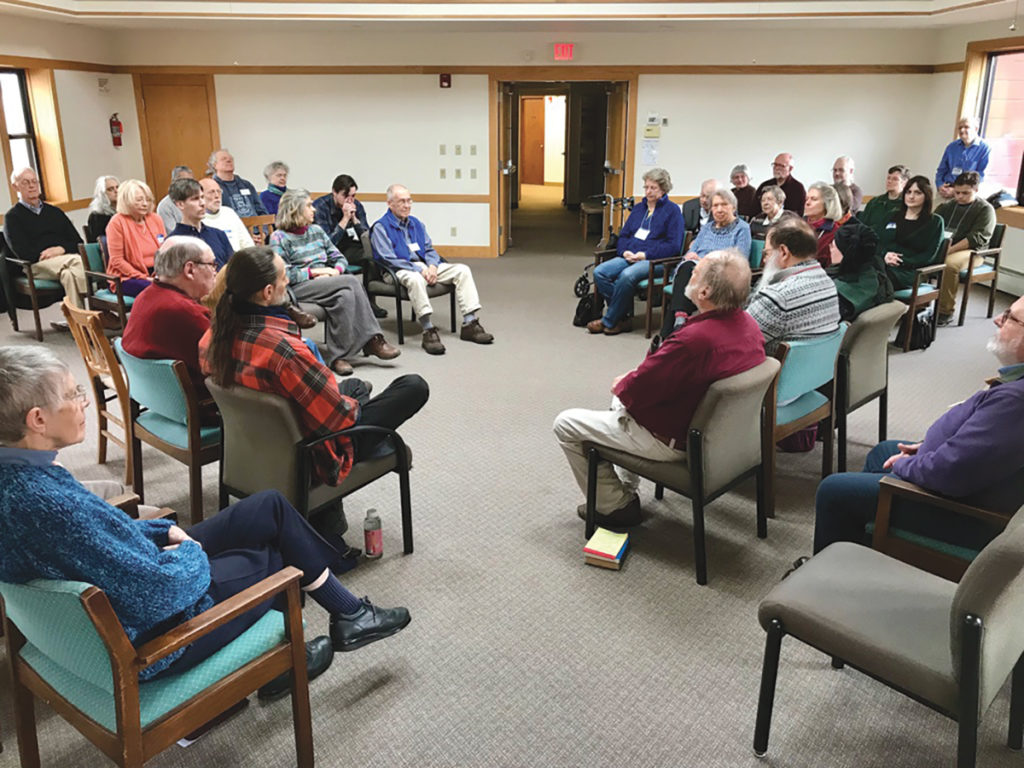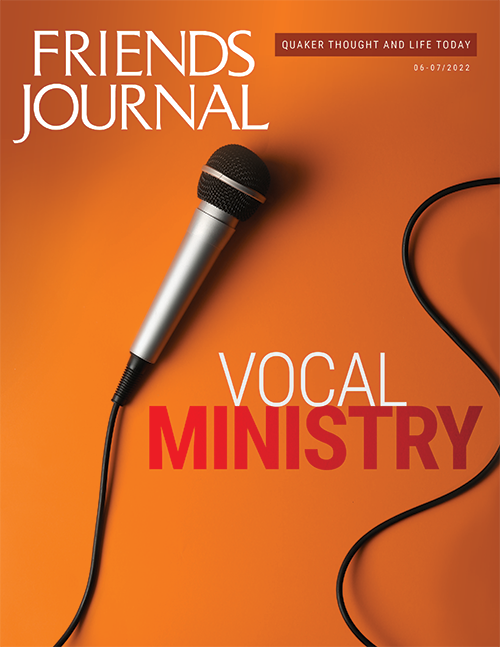Creating a Container for Vocal Ministry
Between 2014 and 2017, New York Yearly Meeting’s Spiritual Nurture Working Group offered to come to a meeting and facilitate any of 12 different workshops. More requests came to us for the workshop on vocal ministry than all of the other 11 combined. We heard that meetings had found vocal ministry to be too frequent and shallow; were troubled by disruptive messages; or, in some cases, that vocal ministry was mostly absent. Some meetings said that they hoped a Friend with gifts in vocal ministry would come join their meeting, and the new arrival would add to their worship the life that was lacking. In all of these cases, the meetings identified vocal ministry as the place where they needed help. And yet, as we worked with the leadership of those meetings, we found that what they needed to attend to first was the level of trust and community that undergirded their meeting, and therefore their meetings for worship.
Many of those Friends gave voice to the understanding that vocal ministry—the voice of the Divine coming through with depth and power—is what would gather their meeting. Actually, it’s the other way around. It’s very rare that vocal ministry alone draws a meeting into a gathered space. Instead, it most often arises through the collective presence of the Friends faithfully gathered in worship. The condition for vocal ministry is created by a reality that we create together as a whole meeting. Once we are grounded in that place of openness and presence as a group, a message may come forward to anyone present. It is often commented on how in a gathered meeting, many of us have heard someone across the room rise and give a message that was also forming in our own hearts.
We create that container for vocal ministry through our individual preparation for worship, our capacity for openness with and trust of each other, and the collective grounding and deep listening of the meeting. I’ll briefly touch on each.
Opening to the Divine in worship requires us to become utterly naked before God, and therefore to the gathered Friends present as well. This is no small matter.
Every book of Quaker faith and practice has either a query or an advice urging Friends to come to meeting “with hearts and minds prepared.” We each do this preparation differently, but two things seem to be essential. First, we need to do what is necessary to nurture our spirits during the week, through daily, or at least steady, spiritual practice. If we each do that essential work, worship becomes the harvest of our week’s spiritual fruits, a feast to which we all bring something. Second, we each need to have worked through the top layer of issues on our minds and hearts in our own space and time, in our own spiritual practice, so that we have within us a spaciousness in which the Divine may have room to be present and, perhaps, to speak through us. In Essays on the Quaker Vision of Gospel Order, Lloyd Lee Wilson wrote:
The practice of corporate waiting worship requires individual preparation on the part of each worshiper. The Friend who has not prepared for corporate worship brings correspondingly less silence with him/her, and the worship is correspondingly less robust. The prepared worshiper, on the other hand, comes to meeting for worship having already shared his/her “routine” issues with God in times of personal prayer and worship rather than saving them up for First-day morning, so that the corporate worship is not a cacophony of personal problems but a quiet group expectancy, a waiting for the Presence of God to become manifest.
Opening to the Divine in worship requires us to become utterly naked before God, and therefore to the gathered Friends present as well. This is no small matter. In order to reach even partway to this challenging goal, we need to have a deep trust in and care for those around us so that we may know we can be vulnerable in their presence. We build deep trust with each other over time, knitting together the fabric of our community through shared experience and through trusting each other in small ways. Through this process we gradually learn that it is okay to trust each other with our vulnerability and openness. And in every community there will be conflicts, small and large. If these conflicts aren’t dealt with openly and skillfully, our capacity to be open with each other is diminished. How we are in our daily dealings with one another determines how we will be in worship. The everyday work of addressing the bumps and bruises that are unavoidable in community life actually impacts the degree to which our meeting will be a vessel for vocal ministry.

Friends worship at Rochester (N.Y.) Meeting. Photo courtesy of the author.
A meeting deeply present, open, and gathered draws forth vocal ministry. Creating the conditions for vocal ministry of depth and power is the responsibility of everyone in the meeting. It is something we create together, all of us.
Thus, we create by our very collective presence the conditions in which vocal ministry is more likely to come forth. It is a painful experience to try to bring forward a message to a room that is not ready to receive it. It feels like trying to push against a stream that is pushing back. In those conditions, what will come out will be halting or more shallow than it might have been. Douglas Steere described this phenomenon in his pamphlet On Listening to Another:
And when the outward listener is not really open, there is usually a closure effected in the speaker himself; a watering down to the conventional level, a safety factor is invoked, a self-preservative function that prevents more than surface exposure. Now we begin to realize what “holy listening” involves.
Much like in a clearness committee when we, through deeply present listening, help a Friend draw forth truths they didn’t know were there, in a meeting gathered in open expectant waiting, we make a space receptive to vocal ministry. Job Scott, a renowned traveling minister among eighteenth-century Friends, wrote in his Journal:
This may be strange doctrine to some; but some others know that the spring must be opened in the hearers, or else there can be but little profitably done by the speaker. And he that speaks only in the ability that God immediately gives, must feel a door of entrance in the people’s minds, or it is very difficult to get safely and relievingly forward.
A meeting deeply present, open, and gathered draws forth vocal ministry. Creating the conditions for vocal ministry of depth and power is the responsibility of everyone in the meeting. It is something we create together, all of us. If we carry a concern for vocal ministry that has life in it, we need to take personal responsibility for helping to birth it, even if we personally are never called upon to speak.




Thank you, Christopher, for an excellent exploration of the challenges undermining the spiritual health of our meetings. I recently left a meeting I’d been attending for 28 years, discontinuing my membership. The only explanation I could give was that, to me, God was no longer at the center of our Meeting for Worship. Your essay expands this feeling, and offers the solutions.
“we need to take personal responsibility for helping to birth it, even if we personally are never called upon to speak.”
These words say exactly the responsibility that all members need to take for their meetings for worship. I say members because a first timer attender, like I was nearly 60 years back, needs to experience a gathered meeting for worship if they are to be convinced of the value of a Quaker Meeting for Worship.